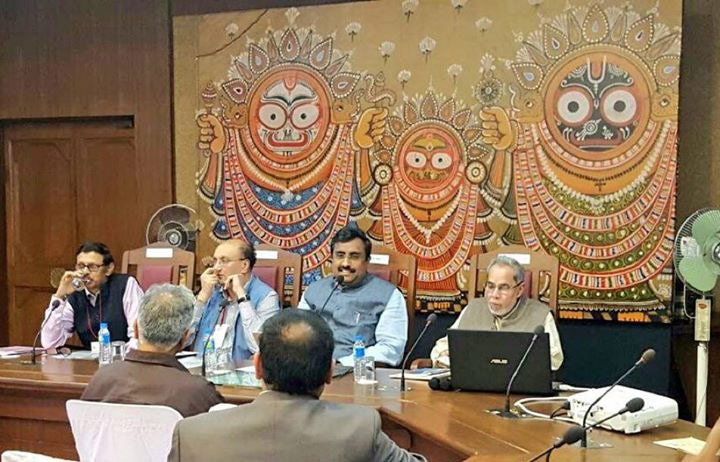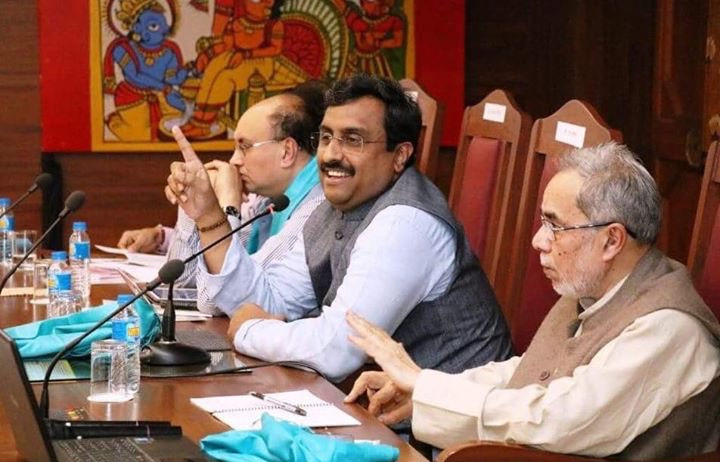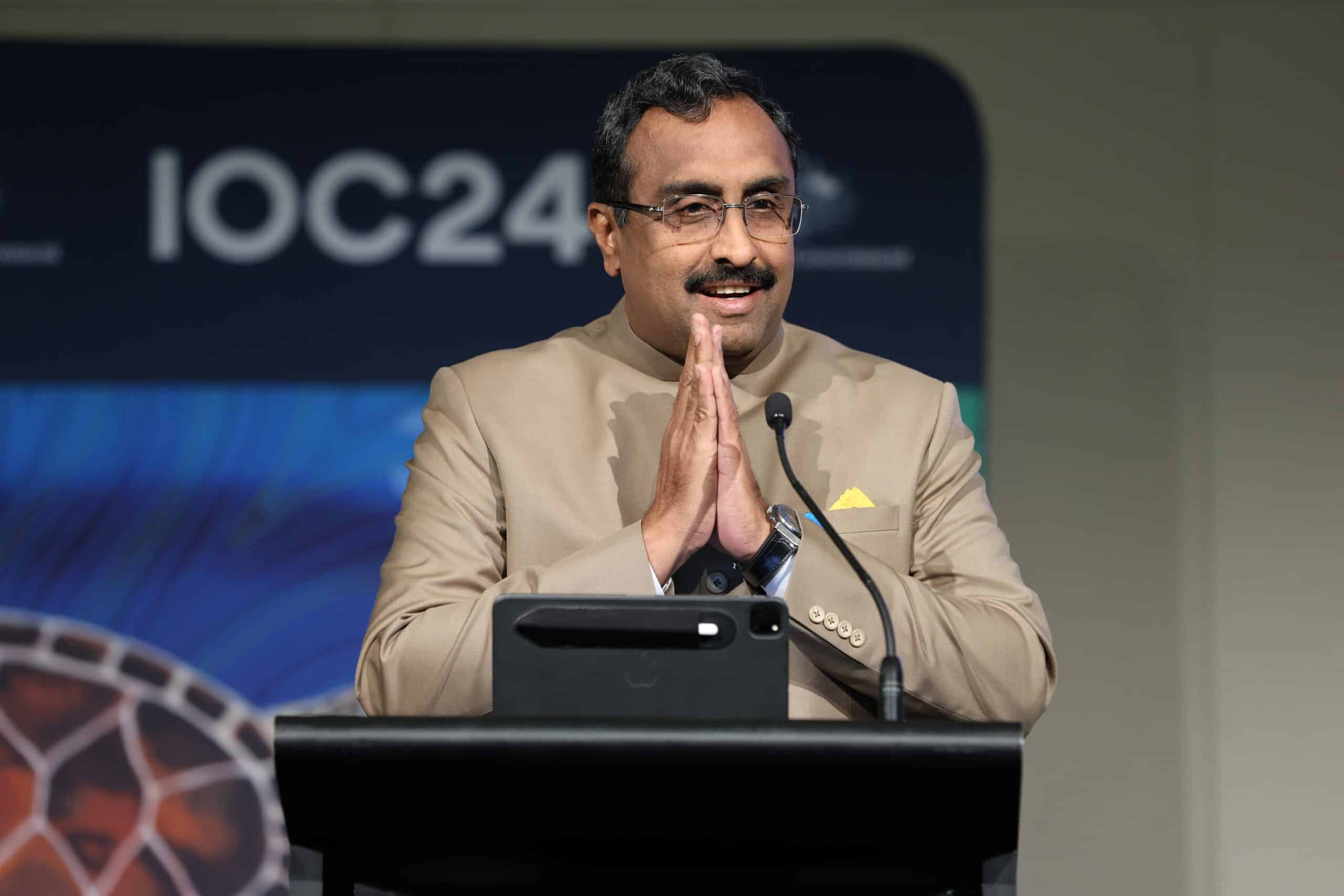
|
Getting your Trinity Audio player ready...
|
Text of Shri Ram Madhav’s address at the Lokmanthan Colloquium Bhopal 12-11-2016
This subject, ‘Imprints of Colonialism in our Political Discourse’, is coming rather 75 years late. We should have settled this issue 65-70 years ago at the time of the Independence itself like many other countries. There was an excellent opportunity at that time to choose a different path. But we didn’t.
The Great Democracy Debate:
Not that nobody had thought about it. There was enough brainstorming over what would be the model that independent India should be following. Two different views emerged. One was that of Gandhiji who had always talked about Gram Swaraj and Ram Rajya. Those who think that those concepts were utopian must understand that given a chance Gandhiji himself or many others who were with him on those issues would have certainly developed a blueprint for the same.
Talking of others behind Gandhi one name that comes to the mind immediately is that of Ram Manohar Lohia. Lohia was originally a diehard fan of Nehru. But on the question of the governance model he became a bitter critic of Nehru and supporter of Gandhiji. Like Gandhiji, Lohia too wanted a model that is indigenous and gels well with Indian genius.
Nehru viewed democracy and Westminster model government as the best option for independent India. He called it the ‘second best available form’. The best, according to him, was ‘yet to be invented’. Although not flawless the Westminster model democracy was seen as the available best model for India after Independence.
In that, interestingly, Nehru got the support of Dr. Ambedkar who believed that the Westminster model parliamentary democracy offered greater accountability to the masses although it is not good for political stability.
 Gandhiji was not opposed to democracy per se. But he was concerned about the majoritarian streak in democratic polity. “Democracy is an impossible thing until the power is shared by all, but let not democracy degenerate into mobocracy”, he used to warn. History tells us that at a time when the world prided over democratically elected leaders like Roosevelt and Churchill the world had also produced Hitler and Mussolini through the same institution. That is why Gandhiji used to emphasise that true democracy is where ‘the power is shared by all’ and where ‘the weak enjoy as much power as the strong’.
Gandhiji was not opposed to democracy per se. But he was concerned about the majoritarian streak in democratic polity. “Democracy is an impossible thing until the power is shared by all, but let not democracy degenerate into mobocracy”, he used to warn. History tells us that at a time when the world prided over democratically elected leaders like Roosevelt and Churchill the world had also produced Hitler and Mussolini through the same institution. That is why Gandhiji used to emphasise that true democracy is where ‘the power is shared by all’ and where ‘the weak enjoy as much power as the strong’.
Lohia detested the Westminster model as a wholly incompatible one for India. He was particularly uncomfortable with the argument that it brings in accountability. Lohia’s view was that the Westminster model doesn’t score high on accountability factor. Our experience in last seven decades proves him right.
A Written Constitution:
However we finally decided in our wisdom that we follow the British Parliament and adopt the Westminster model. The model derives its name from the place from where the British government operates, the Palace of Westminster in London. This model was introduced to us by the British through the Government of India Act of 1935.
Once that decision was taken it was also decided that we should have a written Constitution. Interestingly the world’s oldest democracy, Great Britain or the UK, unlike most modern states, does not have a codified written constitution. Even during their two centuries’ rule over India they didn’t follow any written constitution. UK has an unwritten constitution formed of Acts of Parliament, court judgments and conventions. The United States of America has a written one that was adopted in June 1788 at the Philadelphia Convention. It was more like a social contract between the thirteen states that came together to declare freedom from British colonialists.
In the past history there were no records of Indian rulers depending on written constitutions to run their kingdoms. Even the much talked about Manu Smriti was never a codified constitution of any kingdom. It was like a contemporary moral code to be voluntarily accepted or rejected by the people. Our rulers mostly used to have an Amatya Sabha – Assembly of Ministers – drawn from eminent experts which would advise the ruler in matters of governance. Their wisdom and experience used to be the guiding light of the statecraft.
An ideal stage was conceived by our ancestors as one where there won’t be any state at all.
‘Na Raajyam Naiva Raajaaseet – Na Daandyo Na Cha Daandikah
Dharmenaiva Prajaah Sarve – Rakshanti Sma Parasparam’
(There won’t be any state nor will there be any king; Nobody to punish and nobody to be punished; People will protect each other on the basis of Dharma). Karl Marx also said something similar when he talked about the proletarian dictatorship giving way to withering away of the state.
However, post-independence, we toiled for three years to come up with a comprehensive constitution for India. Dr. Ambedkar played a crucial role in drafting this new constitution. The Constituent Assembly was comprised of great stalwarts who had thoroughly examined each and every clause before finally ratifying it on November 26, 1949. In the end we created a constitution that is not only comprehensive but also the best in the democratic world. It reassured every section of the Indian society, including the most marginalised sections, that the country will hereafter be guided by the rule of law.
It is almost seven decades since we started this journey. A big dilemma bothers us all. Is the Constitution supreme or the people manning it?
Eminent commentator of the American Constitution Joseph Story had warned that, “The constitution has bean reared for immortality, if the work of man may justly aspire to such a title. It may nevertheless perish in an hour by the folly or the corruption or negligence of its only keepers, the people”. It sounds as though the people are the real guarantee for its success.
Even Dr. Ambedkar had said the same thing about the Indian Constitution. “The Constitution can provide only the organs of the state such as the Legislature, the Executive and the Judiciary. The factors on which the working of these organs of the state depend are the people or the political parties that they will set up as their instruments to carry out their wishes and their politics……”, he said.
Implicit in these two statements is the fact that Constitution by itself is not a guarantee as long as the holders of it are not good people. This is undeniably our experience in the last seven decades too.
The Three Pillars:
Look at the three pillars of our democracy – Legislature, Executive and Judiciary.
Legislators have today become all-powerful which is against the very ethos of this country. Chanakya had said that the king should lead the life of the last man in his kingdom. As for the Amatyas he himself presented the ideal through his personal life. But today’s situation is just the opposite. The legislator, an MLA or an MP is extremely powerful. The Legislature has even usurped the powers of the Executive. Even to appoint a primary school teacher in a village or a constable in a police station nothing moves without the approval of the local legislator. This very nature of concentrated power is the major attraction for many unscrupulous elements to get in.
The panacea lies in dis-incentivising the legislative positions. In many countries in the world the legislators enjoy all the powers only within the four walls of the legislature. Outside they are like any other common man. Can it be imagined in India?
The second pillar of the Executive, the Octopus like bureaucracy has also become an uncontrollable institution. The almost 20 million strong bureaucracy, with certainly some honourable exceptions, is today the most unaccountable institution of our government. Art 311 and several court judgements give the bureaucracy greater immunity. They are not only not accountable but also their jobs are largely secure. From Delhi to a Galli their reach and stranglehold is unthinkable. This one institution of the Westminster model has done so much damage to our governance than any other.
Major reforms are needed in making our bureaucracy work effectively. Lateral entry is one such reform to be thought of. Similarly we needed to create different cadre services for different jobs. For example a Sanskrit Service can be created to handle departments that deal with ancient wisdom in HRD, Culture, Tourism etc. We should be able to tap local talent for local development.
Talking of the above two pillars one major departure needed from the colonial system is decentralisation. Our Constitution is unitary in nature with certain powers divested to the states. Even in that the Centre creeps in through the Concurrent List. Genuine decentralisation is needed in order to effectively govern the country. India’s ancient tradition has been one of decentralisation and insularity of the communities from the activities of the king. Kings used to wage wars but the commoners would go on with their daily lives unhindered.
Prime Minister’s call for cooperative federalism is a right step in that direction. However this decentralisation should further extend to village panchayats also. Through 73rd and 74th Amendments we attempted to empower our panchayats. But that has remained half-baked with both centre and states not willing to cede powers. Through Panchayat Raj reforms the villages got some extra money, but no powers. In the ancient Indian system the Gram Sabhas – village self-governing units – enjoyed greater freedom and powers. We need to tweak the existing system to allow for greater powers to local self-governing units. That allows us to move in the direction of less governance and less corruption. As it is said, the best government is the one that governs the least.
The third pillar of judiciary also needs a major reform. Our judiciary is fiercely independent. We should not only respect this independence of our judiciary but also zealously guard it. But we shouldn’t turn a blind eye to the vagaries of this third pillar. Its inefficiency, tardiness and inaccessibility command urgent reform. More over our judiciary practises self-procreation. Judges produce judges. A more balanced and judicious system must be found in place of this practise. National Judicial Appointments Commission – NJAC – is one such good initiative. But unfortunately there is no agreement between the judiciary and the legislature over its structure.
Electoral reforms:
Besides the three pillars of our colonial Westminster system a major reform to be initiated is the electoral reform. First past the post system that we adopted might have worked well in the initial years when Congress party was the biggest pan-Indian party and it had the support of majority of the countrymen. But the present political fragmentation leading to electoral fragmentation calls the validity of the first-past-the-post electoral system itself into question.
A situation in Jharkhand some 15 years ago, described by Late Pramod Mahajan, aptly sums up the lacuna. On a visit to a foreign country as part of a delegation Mahajan had to introduce his delegation members from Jharkhand that included the Chief Minister also. The introduction went something like this: ‘Here is so and so whose party is the largest in Jharkhand Assembly, but he is the Leader of the Opposition in the Assembly. Here is so and so whose party is the second largest but it supports the government from outside. Here is the third largest party which is a part of the ruling coalition, but decided not to join the government. Here are the members of the fourth largest party who are ministers in the Cabinet. And this man is the lone member of the fifth party in the Assembly and he is the Chief Minister’. Such miracles happen in our system leaving it totally unrepresentative of the most important element – ‘will of the people’.
Greek philosopher Plato was never fond of democracy. But he wanted philosopher kings to rule the kingdoms of the world. By that he meant intelligent and benevolent people. Joseph Story too warned that if good people stay away from politics thinking that it is murky and the bad capture power the best constitution in the world wouldn’t be able to save America.
Let me end with Plato’s warning to the good people:
“One penalty for refusing to participate in politics is that you end up being governed by your inferiors”.



